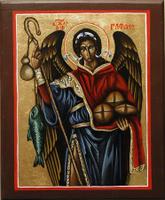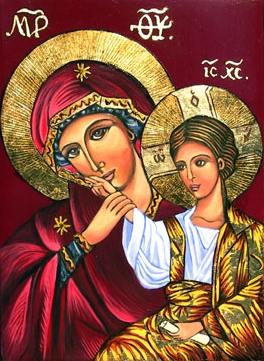Homily for Twenty-Sixth Sunday in Ordinary Time
September 25, 2005
A little more than a year ago, the past Holy Father, Pope John Paul II declared this year the "year of the Eucharist." He asked that pastors spend time talking about the importance of the Eucharist to the Catholic faith. The second Vatican Council referred to the Eucharist as the "source and summit" of our faith, and so it seems that, since this is such an important topic, we should spend some time reflecting on the meaning of our regular participation in the Mass.
Many years ago Bishop Maloney was celebrating a special Mass for the seminarians and he said something in his sermon that has remained with me all these years. He stated that every day, regardless of what else he may have said or done, so long as he celebrated the Mass it was a successful day.
In the four years now that I have been a priest, I have had the opportunity to celebrate Mass hundreds of times. In the great basilicas of Rome and in other, more humble settings. At Funerals, at weddings, weekday Masses, Sunday Masses. Masses where a thousand are present, or where I am the only one. No matter the place or the circumstance, each of these opportunities has had something in common: Christ’s presence.
Having been a priest for over four years now, I can echo these words of Bishop Maloney. The Mass is the most significant thing that we can do in our entire lives. Bishop, priest, or laity, celebrating the Eucharist is the highlight of our life. For every time we celebrate the Mass we come into contact with the very Body and Blood - the very presence - of our Lord and Savior. Every time we cross the threshold of the doors into this building we are crossing the threshold of paradise, for in the Mass we receive a glimpse into heaven. St. Alphonsus Liguori once said that: "if we were to truly recognize what we participate in at every Mass, then we would die of fright at the awesome mystery."
If this is the case, then how sad it truly is that so many of our fellow Catholics no longer believe in Christ’s presence. The Eucharist offers us direct access to our God, who comes to nourish and sustain us in this life… how sad it is that many people fail to recognize this opportunity.
We must question ourselves as well. How much do I appreciate this most incredible gift? We who live in this country have such easy access to the Eucharist. Every day of the week, there are literally dozens of Masses taking place within relatively few miles of our homes. There are many people in our world today who do not have such easy access to the Mass. Some of them must walk for hours on foot to get there only once a week. Some don’t even have the opportunity to go but once every month or two months.
I recall the story of a young man I got to know in my time in seminary. St. Mary’s in Baltimore participated in a program sponsored by the National Bishop’s Conference, whereby seminarians from other parts of the world are invited to come and study. Through this program I had the opportunity to meet many men from third world nations, even nations where the Church is still officially persecuted. One of these men was from a country where the Church is still underground and celebrating the Mass there remains an illegal act. I still remember how anxious he was to return home and be Ordained a priest. I recall how my Ordination and first Mass was a time of celebration and receptions, his was to be done in secret for fear of being arrested. Yet how anxious he was to return to his home and offer the Sacraments to the people.
So why was this? I imagine that his first Mass was attended probably by only a few people. There would have been no beautiful music or vestments to enhance the Mass. I’m sure that they didn’t even have a reception afterwards.
The answer must be that he recognized the true wonder it is to be able to make Christ present in such a tangible way, especially in a part of the world so desperate for God’s presence. Dear brothers and sisters: do we too realize what we participate in here? If so, how well do our actions here in this church reflect that?
We live in a society that is concerned with immediate gratification, and is entertainment driven. Almost every minute of our lives is driven by the idea of what am I going to gain by doing this or that. I get impatient if the microwave takes two minutes to heat my meal rather than one. I turn on the TV and expect immediate entertainment. If we don’t find it then there are 500 other channels to turn to. I want what I want when I want it. It is only natural then that we would be tempted to apply these same principles to our faith as well and come here to this church seeking these same things. Listen to the complaints of those who no longer practice their faith. Oftentimes you will hear people say that they are "bored" when they come to Mass. What’s worse, they say that they "don’t get anything out of the Mass." They complain about the music, the bad preaching, the ugly artwork, or whatever else that keeps them from "enjoying themselves." And they are right! Church choirs miss the occasional note, there are plenty of churches filled with ugly things, and this isn’t the best sermon I’ve ever heard.
We must remind ourselves, brothers and sisters, that we are not here to be entertained. We are not here to feel good. We are here first and foremost to offer worship to the Living God. We are here first and foremost to give ourselves completely to the Father, in imitation of Christ Himself, who in this holy sacrifice gives all that He has: body, blood, soul, and divinity. Our new Holy Father, Benedict, in his many writings on the liturgy, has constantly reminded us that our worship’s true purpose is fulfilled when we first orient ourselves towards God.
Sadly, we see how oftentimes in the past forty or so years the temptation has been to place the emphasis of the Church’s worship upon ourselves. Song after song has been composed during this time that concentrates solely upon us, the congregation. Sadly, priest after priest, and countless "worship committees," have seen fit to alter the Church’s liturgy, somehow thinking that they can "improve upon it." To conform the liturgy to ourselves, rather than accepting the challenge to conform ourselves to the liturgy. These efforts have helped lead us to the erroneous assumption that the Mass is first and foremost about me, when in fact it is about God. This being the case, it is easier to understand people’s criticism that the Mass has become boring: for this is precisely so if the Mass is only about me. For most people can be intrigued only for so long by merely staring at themselves. The fruit of this attitude has been in helping to bring about an atmosphere of idolatry in our worship. The people of Moses’ time falsely erected a golden calf, we must not do the same.
We must evaluate what it is we come here seeking. Is it entertainment? Go to the theater or the movies. Is it to hear what a great person I am? Go to group therapy. Is it to hear great music performed flawlessly? Go to a concert. But if you are here first and foremost to give yourself to God; to humbly kneel and bow down before the one who made you, then we are in the perfect place.
Fr. Paul Beach
Friday, September 30, 2005
Teach, Father, Teach
Priestly Celibacy and the Vocation of Love
Priestly Celibacy and the Vocation to Love
Interview With a Physician-Theologian
PAMPLONA, Spain, SEPT. 29, 2005 (Zenit.org).- The question of priestly celibacy is bubbling to the surface once again.
The topic came to the fore in Spain, where a married Anglican minister converted to the Catholic Church and was ordained. In Wiesbaden, Germany, meanwhile, 80 married former Catholic priests appealed to the Pope to put an end to the requirement of clerical celibacy.
To address the topic, the Veritas news agency interviewed Father Juan Ramón García-Morato, author of the recently published book "Created by Love, Chosen to Love" (EUNSA Publishers).
García-Morato, a physician and theologian, teaches a course on Theory of Culture in the School of Medicine of the University of Navarre. He is also chaplain of that school.
Q: Why do you affirm that celibacy is a path to Christian fullness?
Father García-Morato: Both celibacy as well as marriage are paths to Christian fullness, namely, to holiness.
We are all called to love, and Christian revelation points out two ways of realizing fully this vocation: marriage and celibacy in any of its forms. Both are included in God's plans. Both need each other to understand each other better.
Both are a path of self-giving. And to give oneself, one must first possess oneself. "Half an orange," as understood in ordinary language, doesn't exist. No person is "by halves," needy of another -- especially designed for himself -- to be complete.
Each person is complete in himself. Only a complete person can bring his whole self into play and give himself -- to God or to another person -- with sufficient maturity to make that decision freely.
This is why celibacy is also a path of human and Christian fullness. Because when it comes to loving God, in response to a call that implies that gift, all human dimensions must come into play, also those that depend on the masculine or feminine condition, excluding simply the exercise of sexuality. But that is the lifestyle of Christ, perfect man, and of the Virgin -- a lifestyle that has an irreplaceable role in the history of redemption.
Q: Do you think it is a topic that can be revised theologically? Could the law of celibacy be abolished?
Father García-Morato: Of course, celibacy is not a dogma of faith. It is a way of life that grew within the Church since the second century.
In this connection, in the measure that the link between celibacy and priesthood is not essential, but of profound congruence between the mystery of Christ and the mystery of the sacramental participation in his priesthood, there is room for the hypothetical possibility to abolish celibacy, as any other ecclesiastical law that does not respond directly to an express mandate of divine law.
However, the conviction of the Church in regard to the congruence of the priesthood with the priestly ministry is neither pragmatic nor situational, but profoundly based.
I think that the explanation can be found here for the fact that -- in a sociological and cultural situation such as the present one, with the difficulties known by all in the matter of vocations -- the Catholic Church continues to trust in God's continuing to distribute the gift of celibacy among many young men and in his sending the necessary sacred ministers for the life of the Church.
Q: As a doctor, do you think that celibacy is a "repression" or that it can result in psychological problems?
Father García-Morato: Celibacy does not impoverish the personality. On the contrary, by being one of the paths to full realization of the person's vocation to love, it enriches him. I have seen this many times, thank God. However, I am aware that there are individuals who wonder if it is not emotionally and mentally healthier to have a couple and a family rather than to live celibacy.
As I said earlier, each person is complete in himself and is fulfilled in relation with others. But as it is not possible to relate to all persons, or to make use of the innumerable opportunities to relate to one another, each one chooses freely those he considers most appropriate for his personal fulfillment.
The problem, to my mind, does not reside in living celibacy. In life, what is terrible for the inner harmony and mental health of a man or woman does not lie in being celibate or married. The crux of the question lies in having made a free decision and having chosen something that affects one's whole existence and then continuing to envy what one has not chosen, filling oneself with ever greater anxiety.
Thus permanent longing as a style of life -- one of the ways of putting the hand to the plow and continuing to look back -- can only be a source of immaturity, which destroys and plays havoc with any existing commitment and even ends up by making one incapable for future commitments.
We must all learn to make decisions and to understand that, with every decision, we discard many options; and assume it with the view of one who starts on new paths full of surprises. That is why, faced with the fundamental questions of life, decisions must only be made if we are aware and are prepared to have them be decisions that, in fact, draw after them the whole personality.
If a decision is made, and the rest of the personality goes another way, inevitably a high-risk situation is created for mental health and personal harmony, both in celibacy as well as marriage.
Thursday, September 29, 2005
Feast of the Archangels
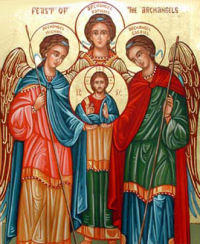
St. Michael the Archangel is my Confirmation saint, so I'm pretty pumped about today :)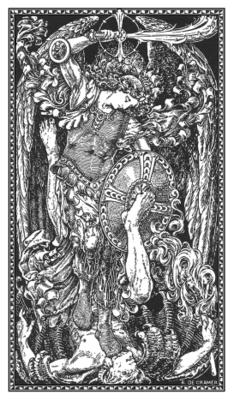
Prayer to St. Michael the Archangel:
St. Michael the Archangel, defend us in battle;
be our protection against the wickedness and snares of the devil.
May God rebuke him, we humbly pray;
and do thou, O prince of the heavenly host,
by the power of God,
cast into hell Satan and all evil spirits
who prowl about the world,
seeking the ruin of souls. Amen.
Pray to St. Gabriel the Archangel:
Blessed Saint Gabriel, Archangel
We beseech you to intercede for us at the throne of divine mercy: As you announced the mystery of the Incarnation to Mary, so through your prayers may we receive strength of faith and courage of spirit, and thus find favor with God and redemption through Christ Our Lord. May we sing the praise of God our Savior with the angels and saints in heaven forever and ever. Amen.
Prayer to St. Raphael the Archangel:
Blessed Saint Raphael, Archangel, We beseech you to help us in all our needs and trials of this life, as you, through the power of God, didst restore sight and gave guidance to young Tobit. We humbly seek your aid and intercession, that our souls may be healed,our bodies protected from all ills,and that through divine grace we may become fit to dwell in the eternal Glory of God in heaven. Amen.
Our Lady of Compassion
Mariology Symposium to Focus on Compassion
VATICAN CITY, SEPT. 28, 2005 (Zenit.org).- Compassion and its presence in the life of Mary of Nazareth will be the focus of the 15th International Mariological Symposium, to be held Oct. 4-7 in Rome.
On this occasion, Monsignor René Laurentin, the renowned Mariologist, will confer the René Laurentin-Pro Ancilla Domini award in memory of Servite Father Ignacio María Calabuig, a professor of Mariology who died last year.
This biannual meeting dedicated to Mariology will take place in the Theological Faculty Marianum. This year it will "explore the theological category of compassion as key in reading the significance and role of the Mother of Jesus in the history of salvation," the organizers said in a statement.
Monsignor Angelo Vincenzo Zani, undersecretary of the Congregation for Catholic Education, will preside over the morning session Oct. 4.
Pope John Paul I

Servant of God, Pope John Paul I, Albino Luciani, pray for us!
Benedict XVI Recalls the "Unforgettable" John Paul I
On Anniversary of His 1978 Death
VATICAN CITY, SEPT. 28, 2005 (Zenit.org).- "Unforgettable for all of us" is how Benedict XVI evoked the memory of his predecessor Pope John Paul I, on the 27th anniversary of his death.
Benedict XVI spoke spontaneously at the end of today's general audience, to greet in Italian "the faithful of the Diocese of Belluno-Feltre who, together with its bishop, Monsignor Giuseppe Andrich," came to Rome "to make a grateful and prayerful remembrance" of the Servant of God, John Paul I, on the anniversary of his death.
John Paul I was born Albino Luciani in that diocese on Oct. 17, 1912. He was ordained a priest in 1935, and received episcopal ordination in 1958. Eleven years later, Pope Paul VI named him archbishop patriarch of Venice, and in 1973 he was elevated to cardinal.
Elected Pope on Aug. 26, 1978, he died unexpectedly, 33 days later.
On Nov. 23, 2003, the diocesan phase of John Paul I's cause for beatification opened in the Cathedral of Belluno.
In late 2004 Cardinal Joseph Ratzinger (now Benedict XVI) acknowledged in the province of Belluno that he prayed "every day for this beatification."
"Pope Luciani is an example for us all," said the then prefect of the Congregation for the Doctrine of the Faith.
The postulator of the cause for John Paul I's beatification, Monsignor Giorgio Lise, told the Web site Korazym: "From the testimonies I receive, humility, confident abandonment in God, and hope are the characteristics of his spirituality."
Monsignor Lise is director of the Pope Luciani Center.
Tuesday, September 27, 2005
first paper
1. Explain Plato's understanding of the human person as presented in the Phaedo. Make sure you take account of:
A. His discussion of the nature of the soul and the significance of death
B. The connection between the immortality of the soul and
a. what he says about the "forms" and
b. his understanding of learning as "recollection"
C. His conception of what constitutes the "good life" for human being.
In describing Plato's views, be sure to note the strengths and weaknesses you see in them. In particular, do the arguments he adduces in support of them work?
2. Compare Plato's views to the views of Paul as described in 1 Corinthians 15. In what ways are they similar? How are they different?
(4-5 pages, typed, double-spaced)
Not tooo bad...we'll see. I may even post the paper here!
Our Lady, Seat of Wisdom, pray for us!
Saturday, September 24, 2005
Epistemological Hell
SOCRATES: Now, when a person has this knowledge, and is considering something which he sees or hears, may not false opinion arise in the following manner?
THEAETETUS: In what manner?
SOC. When he thinks what he knows, sometimes to be what he knows, and sometimes to be what he does not know. We were wrong before in denying the possibility of this.
THEAET. And how would you amend the former statement?
SOC. I should begin by making a list of the impossible cases which must be excluded. (1) No one can think one thing to be another when he does not perceive either of them, but has the memorial or seal of both of them in his mind; nor can any mistaking of one thing for another occur, when he only knows one, and does not know, and has no impression of the other; nor can he think that one thing which he does not know is another thing which he does not know, or that what he does not know is what he knows; nor (2) that one thing which he perceives is another thing which he perceives, or that something which he perceives is something which he does not perceive; or that something which he does not perceive is something else which he does not perceive; or that something which he does not percieve is somthing which he perceives; nor again (3) can he think that something which he knows and perceives, and of which he has the impression coinciding with sense, is something else which he knows and perceives, and of which he has the impression coinciding with sense; -- this last case, if possible, is still more inconceivable than the others; nor (4) can he think that something which he knows and perceives, and of which he has the memorial in good order, is something else which he knows; nor if his mind is thus furnished, can he think that a thing which he knows and perceives is another thing which he perceives; or that a thing which he does not know and does not perceive, is the same as another thing which he does not know and does not perceive, is the same as another thing which he does not know and does not percieve; -- nor again, can he suppose that a thing which he does not know and does not perceive is the same as another thing which he does not know; or that a thing which he does not know and does not perceive is another thing which he does not perceive: -- All these utterly and absolutely exclude the possibility of false opinion. The only cases, if any, which remain, are the following.
THEAET. What are they? If you tell me, I may perhaps understand you better; but at present I am unable to follow you.
SOC. A person may think that some thing which he knows, or which he perceives and does not know, are some other things which he knows and perceives; or that some things which he knows and perceives, are other things which he knows and perceives.
THEAET. I understand you less than ever now.
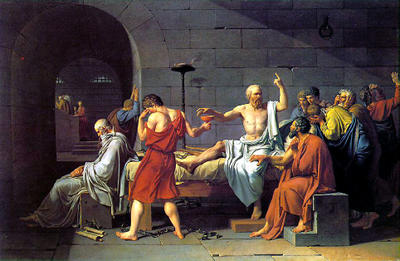
Thursday, September 22, 2005
Slowly growing...

But grace was given to each of us according to the measure of Christ’s gift. And he gave some as Apostles, others as prophets, others as evangelists, others as pastors and teachers, to equip the holy ones for the work of ministry, for building up the Body of Christ, until we all attain to the unity of faith and knowledge of the Son of God, to mature manhood, to the extent of the full stature of Christ, so that we may no longer be infants... Rather, living the truth in love, we should grow in every way into him who is the head, Christ...
Wednesday, September 21, 2005
Feast of St. Matthew!
The readings today treat this good apostle and evangelist so be sure you check them out if you haven't gone to Mass today.
I always like to joke around and say "yeah, my first name is Matthew, the tax collector, and my middle name is Thomas, the doubter so I got the one-two punch!" But, I think they are appropriate, I too get frequently caught up in money, materialism, doubt, and unblief. I also like to think of it as an honor to be named after these two apostles. While they both get a bad wrap, we must also keep in mind that they both had profound conversions:
And
St. Thomas, upon seeing and probing the wounds of our Blessed Lord after his Resurrection cast out all doubt he had before and made one of the most profound proclamations of Christ's deity in the entire New Testament, "My Lord and My God."
My personal prayer: "St. Matthew, pray for me that I might hear Christ's voice and follow him as couragously as you did. And St. Thomas, pray for me that I might trust in our Lord's grace and mercy and come to a more profound belief in Him."
God of mercy, you chose a tax collector, Saint Matthew, to share the dignity of the apostles. By his example and prayers help us to follow Christ and remain faithful in your service. We ask this through our Lord Jesus Christ, your Son, who lives and reigns with you and the Holy Spirit, one God, for ever and ever.
Requiescant in Pace
The followng is from Phatmass.com:
 The phatmass phamily remembers and prays for Jared and Matty, the two Archdiocese of Kansas City seminarians and who recently died in a car accident. They were both members of the phatmass phorum. They answered their call from God, and their example demands the same love and action from us. May the perpetual light of God shine upon them so that their souls may rest in peace.
The phatmass phamily remembers and prays for Jared and Matty, the two Archdiocese of Kansas City seminarians and who recently died in a car accident. They were both members of the phatmass phorum. They answered their call from God, and their example demands the same love and action from us. May the perpetual light of God shine upon them so that their souls may rest in peace.
"We first want to extend our deepest sympathies to the parents and families of Matty Molnar and Jared Cheek. Both Archbishop Keleher and I were truly impressed with the wonderful service they rendered Christ in their few short years of work here in the archdiocese, both as youth ministers and, more recently, as seminarians.
Their deaths are a great loss for the archdiocese, and they will be deeply felt by the entire archdiocesan family. Their example, however, is not lost to us: They were both wonderful and exuberant missionaries of Christ’s love, and representative of the high quality of young men we have studying for the priesthood of the archdiocese.
We ask all the faithful to pray for the happy repose of Matty’s and Jared’s souls and for the comfort and peace of their families." - Archbishop Joseph F. Naumann
Last Words of John Paul the Great

John Paul II's Last Words
Vatican Publishes the Final "Stations" of His Way of the Cross
VATICAN CITY, SEPT. 20, 2005 (ZENIT.org).- Pope John Paul II's last words before his death April 2 were, "Let me go to the house of the Father," says a chronicle published by the Holy See.
The latest edition of the Acta Apostolicae Sedis, the official Vatican bulletin, begins with the narration of about four pages in Italian, with an introduction in Latin. The text details the last days of John Paul II.
The chronicle of April 2 begins at 7:30 p.m. with the Mass celebrated in the Holy Father's presence, "who began to experience the beginning of the loss of consciousness."
"At the end of the morning he received the cardinal Secretary of State for the last time and then began a sharp increase in temperature," the document said.
"Around 3:30 p.m., with a feeble and hoarse voice, in Polish, the Holy Father pleaded, 'Let me go to the house of the Father,'" the text said. "A little before 7 p.m. he entered a coma. The monitor documented the progressive exhaustion of his vital functions.
"According to a Polish tradition, a small candle lit up the darkness of the chamber where the Pope was slowing fading away.
"At 8 p.m. began the Mass for the feast of Divine Mercy at the foot of the dying Pontiff's bed. The rite was presided by Archbishop Stanislaw Dziwisz, John Paul II's private secretary, together with Cardinal Marian Jaworski, archbishop of Lviv of the Latin rite, Archbishop Stanislaw Rylko, president of the Pontifical Council for the Laity, and Monsignor Mieczyslaw Mokrzycki, the Pope's other personal secretary.
"Liturgical songs accompanied the celebration and they blended with those of the youth and the multitude of faithful gathered in prayer in St. Peter's Square. At 9:37 p.m. John Paul II fell asleep in the Lord."
Cardinals on hand
Cardinal Angelo Sodano, Vatican secretary of state; Cardinal Joseph Ratzinger, dean of the College of Cardinals (now Benedict XVI); Cardinal Eduardo Martínez Somalo, chamberlain of the Holy Roman Church; and several other members of the papal circle arrived immediately to pay their respects to the deceased Pope.
The chronicle coincides with the information given to the media at the time by Joaquín Navarro Valls, director of the Vatican press office.
The spokesman revealed that on April 1, as the multitude prayed for the Pope in St. Peter's Square, John Paul II had said, referring to the youth present, "I have sought you. Now you have come to see me. I thank you."
That day, the eve of his death, according to the Acta Apostolicae Sedis, the Pope was "conscious and serene."
In the morning he concelebrated Mass at 7:15 a.m. and then listened to the reading of the Stations of the Cross, making a sign of the cross at every station.
"Next he asked to listen to the reading of the Third Hour of Prayer during the Day, of the Divine Office, and some passages from Sacred Scripture," the document said. "The situation was of notable seriousness, characterized by the alarming situation of the parameters of his vital signs."
Septic shock
"The patient united himself to the continual prayers of those that assisted him," the document adds.
The text offers details concerning the Pope's illness that until now had been unknown. His condition worsened on March 31.
"Just after 11:00, the Holy Father, who had gone to the chapel to celebrate holy Mass, was possessed by violent shivering which was followed by a sharp elevation of his temperature until it reached 39.6 degrees C," the text explains. That is equivalent to 103.3 degrees F.
"He later fell into a serious septic shock and a collapse of his cardiovascular system caused by an infection of his urinary tract," it adds, confirming data revealed by Navarro Valls at the time.
"The Pope's explicit wish to remain in his room was respected, where complete and efficient assistance was assured," it clarifies.
The text continues: "In the afternoon, Mass was celebrated at the foot of the Pope's bed. He concelebrated with them, with his eyes partially closed, but in the moment of the consecration, he feebly lifted his arm on two occasions, that is to say, over the bread and over the wine.
"He also seemed to make the gesture of touching his chest as he recited the Agnus Dei. The cardinal of Lviv of the Latin rite (Marian Jaworski n.d.r.) administered the Anointing of the Sick. At 7:17 the Pope received Communion. He next asked that a holy hour of prayer and meditation be celebrated."
Blessing the multitude
The chronicle also gathers details concerning the previous periods of hospitalization of the Pope in the Gemelli Polyclinic of Rome and concerning his public appearances, despite his weakness. It describes his appearance at the window of his study on March 30, in which "he gave his blessing to the multitude, which, amazed and sad, received it from St. Peter's Square."
"This was the last public 'station' of his painful Way of the Cross," the text states.
The rest of the volume of the Acta Apostolicae Sedis gathers all the official documents of recognition of his death, his will and testament (original in Polish), the Mass for the deceased Pontiff, the name of the delegations that participated in the funeral Mass and about 150 pages with messages of condolence sent by international representatives.
[To buy the volume, visit www.libreriaeditricevaticana.com or e-mail vendita@publish.va.]
Monday, September 19, 2005
God in the Streets of New York
http://www.vocation.com/content-ajd.htm
Here's some shots from the video:







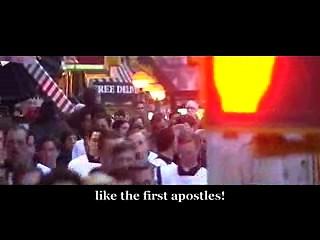

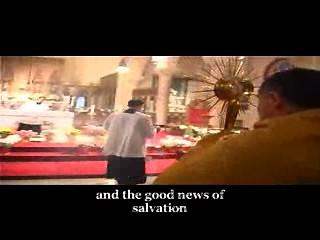


Sunday, September 18, 2005
On Holiness and the Blessed Sacrament
On Holiness and the Blessed Sacrament
"The Priests Who Are in Love With the Eucharist"
CASTEL GANDOLFO, Italy, SEPT. 18, 2005 (Zenit.org).- Here is a translation of the address Benedict XVI gave today before he prayed the midday Angelus with the crowds gathered at the
papal summer residence.
* * *
Dear brothers and sisters:
As the Year of the Eucharist comes to an end, I would like to take up again a particularly important topic, one which was dear to the heart of my predecessor, Pope John Paul II: the relationship between holiness, the path and destination of the Church and of every Christian, and the Eucharist.
In particular, my words today are directed to priests in order to underline that in the Eucharist is precisely the secret to their sanctification. In virtue of holy orders, the priest receives the gift and the commitment to repeat sacramentally the gestures and words with which Jesus, in the Last Supper, instituted the memorial of his Pasch.
In his hands this great miracle of love is renewed, from which he is called to convert himself into witness and herald, every day more faithful ("Mane Nobiscum Domine," No. 30).
For this reason the priest must be, before all else, one who adores and contemplates the Eucharist, from the moment he celebrates the sacrament.
We know well that the validity of the sacrament does not depend on the holiness of the celebrant, but the effectiveness of the sacrament for him and for others would be greater in the measure that he lives with a profound faith, an ardent love and a fervent spirit of prayer.
During the year, the liturgy presents us as examples holy ministers of the altar, which from daily intimacy with Christ in the celebration and adoration of the Eucharist, have found the strength to imitate him.
A few days ago we celebrated the feast of St. John Chrysostom, patriarch of Constantinople at the end of the fourth century. It was said that he had a "golden mouth" due to his extraordinary eloquence, but he was also called a "Eucharistic doctor" for the magnitude and profundity of his doctrine on the Blessed Sacrament.
The Divine Liturgy, which is more celebrated in Eastern Churches [and] carries his name and his motto -- "A man full of zeal is enough to transform an entire people" -- demonstrates the effectiveness of the action of Christ through his sacraments.
In our time, the figure of St. Pio of Pietrelcina stands out, whom we will remember next Friday. Celebrating the holy Mass, he relived with such fervor the mystery of Calvary and the faith and devotion of all. Even the stigmata that God gave to him were expressions of his intimate conformity with Jesus crucified.
Thinking of the priests who are in love with the Eucharist, it is not possible to forget St. John Mary Vianney, humble parish priest of Ars in the time of the French Revolution. With a holy life and pastoral zeal he managed to make the small town of Ars into a model Christian community animated by the Word of God and the sacraments.
We will direct ourselves now to Mary, praying in a special way for all priests of the world so that they take from this Year of the Eucharist the fruit of renewed love for the sacrament that they celebrate.
May they, through the intercession of the Virgin Mother of God, be able to always live and give
testimony to the mystery that has been place in their hands for the salvation of the world.
[The Pope then greeted pilgrims in several languages. In English, he said:]
I extend a warm welcome to all the English-speaking visitors present at today's Angelus. May your time here at Castel Gandolfo and your stay in Rome be filled with joy and deepen your
love of the universal Church. I wish you a happy and blessed Sunday!
Saturday, September 17, 2005
the abortion clinic
After talking with Jean some I prayed morning prayer next to the driveway while Max paced back and forth praying his rosary. Then when I was done we knelt down together and prayed a St. Louis de Montfort Rosary. It's like a regular rosary only there are little prayers that introduce and conclude each mystery. There's also a little phrase you add to the middle of each Hail Mary.
For example, today was the Joyful mysteries. So for the first decade we'd start with:
We offer Thee, O Lord Jesus, this firt decade in honor of Thy Incarnation and we ask of Thee, through this mystery and through the intercession of Thy most Holy Mother, a profound humility.
Then in the middle of each Hail Mary we'd say:
And blessed is the fruit of Thy Womb: Jesus incarnate
We'd conclude the decade with:
Grace of the mystery of the Incarnation, come down into our souls and make them truly humble.
There's a different prayer and phrase for each mystery. It was cool. (The whole thing can be found in St. Louis de Montfort's Secret of the Rosary, here or here)
One young lady even knelt down beside Max and joined us in the rosary...that was cool too :) She's in a young adult group that meets monthly to pray the rosary; we gave her our email addresses.
One thing that Jean said struck me. She said many times God allows us to go through trials so that he can put in our face who we need to pray for! She said when she got arrested, "Oh, I guess these officers need prayers!" hehe. I thought that was a good way to look at it. She said one time she told the three escorts working there that she would pray for them. It was two men and a woman. The two men scoffed but the woman said, "My name is Kimberly, you can pray for me" which angered the guys. So now the Holy Spirit has given us a name to pray for. Let us pray for Kimberly.
St. Gianna Beretta Molla, pray for her...and us.
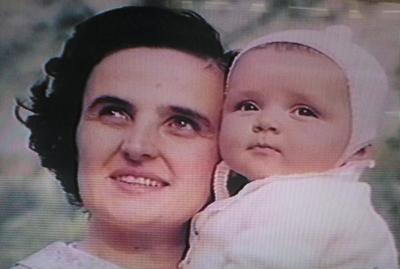
Thursday, September 15, 2005
Our Lady of Sorrows

Stabat Mater
(At the Cross Her Station Keeping)
Luke 2:34-35
At the cross her station keeping,
Stood the mournful Mother weeping,
Close to Jesus to the last.
Through her heart, His sorrow sharing,
All His bitter anguish bearing,
Now at length the sword had pass'd.
Oh, how sad and sore distress'd
Was that Mother highly blest
Of the sole-begotten One!
Christ above in torment hangs;
She beneath beholds the pangs
Of her dying glorious Son.
Is there one who would not weep,
Whelm'd in miseries so deep
Christ's dear Mother to behold?
Can the human heart refrain
From partaking in her pain,
In that Mother's pain untold?
Bruis'd, derided, curs'd, defil'd,
She beheld her tender child
All with bloody scourges rent.
For the sins of His own nation,
Saw Him hang in desolation,
Till His spirit forth He sent.
O thou Mother! fount of love!
Touch my spirit from above;
Make my heart with thine accord.
Make me feel as thou hast felt;
Make my soul to glow and melt
With the love of Christ our Lord.
Holy Mother! pierce me through;
In my heart each wound renew
Of my Saviour crucified.
Let me share with thee His pain,
Who for all my sins was slain,
Who for me in torments died.
Let me mingle tears with thee,
Mourning Him who mourn'd for me,
All the days that I may live.
By the cross with thee to stay,
There with thee to weep and pray,
Is all I ask of thee to give.
Virgin of all virgins best,
Listen to my fond request
Let me share thy grief divine.
Let me, to my latest breath,
In my body bear the death
Of that dying Son of thine.
Wounded with His every wound,
Steep my soul till it hath swoon'd
In His very blood away.
Be to me, O Virgin, nigh,
Lest in flames I burn and die,
In His awful Judgment day.
Christ, when Thou shalt call me hence,
Be Thy Mother my defence,
Be Thy cross my victory.
While my body here decays,
May my soul Thy goodness praise,
Safe in Paradise with Thee.
Collect:
Father, as your Son was raised on the cross, his mother Mary stood by him, sharing his sufferings. May your Church be united with Christ in his suffering and death and so come to share in his rising to new life, where he lives and reigns with you and the Holy Spirit, one God, for ever and ever.
Amen.
CRS meeting at St.Mary's

We got a notice yesterday that the Catholic Relief Services Board of Trustees meeing will be held in our Center for Continuing Formation today and tomorrow. The following bishops will be here...which is kinda cool:
Bishop Robert Lynch
St. Petersburg, Florida
Bishop Nicholas DiMarzio
Brooklyn, NY
Cardinal McCarrick
Washington, D.C.
Bishop John McCormack
Manchester, New Hampshire
Bishop George Murry, S.J.
St. Thomas, U.S. Virgin Islands
Bishop George Thomas
Helena, Montana
Bishop John Yanta (the same Bishop Yanta that allowed Fr. Pavone to start the new pro-life religious community in Texas.)
Amarillo, Texas
Bishop Patrick Cooney
Gaylord, Michigan
Wednesday, September 14, 2005
Triumph of the Cross
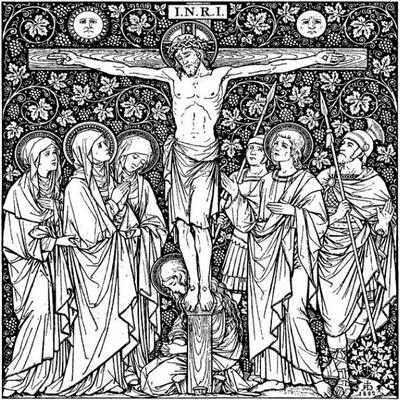
Prayer before a Crucifx:
Look down upon me, good and gentle Jesus, while before Thy face I humbly kneel, and with burning soul I pray and beseech Thee to fix deep in my heart lively sentiments of faith, hope and charity, true contrition for my sins, and a firm purpose of amendment; while I contemplate with great love and tender pity Thy five wounds, pondering over them within me, having in mind the words which David Thy prophet said of Thee, my Jesus: "They have pierced my hands and my feet; they have numbered all my bones."
Collect:
God our Father, in obedience to you your only Son accepted death on the cross for the salvation of mankind. We acknowledge the mystery of the cross on earth. May we receive the gift of redemption in heaven. We ask this through our Lord Jesus Christ, your Son, who lives and reigns with you and the Holy Spirit, one God, for ever and ever.
Fr. Paul's homily: 9-11
Homily for Twenty-Fourth Sunday in Ordinary Time
September 11, 2005
As people who live in our 21st century society, we are very accustomed to a certain way of life. There are certain principles that we live by. One of the most foundational of these principles is that we should get what we pay for.
Earlier this week, I stopped at a McDonald’s on my way to a meeting in Louisville to get a bite to eat for breakfast. Two apple pies and a large coffee: the staple of my diet… Since the coffee is always served scalding hot, I ate my two apple pies first, giving the coffee time to cool down a bit. Three or four miles down the road I popped off the top and much to my chagrin, the cup was barely more than half full. Admittedly, I was immediately a little upset. The first thought in my mind was: "hey, I paid for a large cup of coffee, not a small one." I even felt a bit cheated. Now this was just an incredibly small matter: it’s just a cup of coffee.
I’m happy to say that I didn’t turn around and go back to complain. But how easily this small event caused such a reaction in me. It’s evidence of this attitude we all have to some degree. I want to get what’s coming to me. If I pay my fifty dollars for a gallon of gas, I want every last drop of that gallon… and not a drip less.
Our gospel this weekend, however, portrays a different picture. Our Lord reminds us that sometimes we shouldn’t really want what’s coming to us.
It’s safe to say: no one here is without sin. Not one person in this church doesn’t have something that they regret having said or done. It’s simply a fact: there have only been two people in the history of the world who were sinless, and I’m not one of them. Our actions, we are reminded, have consequences. We live in a world where what we say and do have an effect, good or bad, on ourselves and the people around us.
The story of our gospel this weekend reminds us of two essential elements of our Christian faith. First of all is that God is willing, even anxious, to forgive us our sins. Jesus is continually calling people to recognize their need for forgiveness, and to turn to His heavenly Father. Jesus’ teachings are all characterized by this, He even forgave people their sins Himself. This was a scandal to His religious contemporaries, and is ultimately the reason He was crucified.
The second essential element of faith is that we must be willing to forgive. Repeatedly Jesus speaks of this throughout His life and ministry. "Love one another as I have loved you," is His great commandment to His disciples. When His disciples asked Him how to pray He taught them to say the words: "forgive us our trespasses as we forgive those who trespass against us." Our gospel passage this weekend is a reiteration of these words. God forgives us our sins, and our response must be to share that forgiveness with others.
This, I’m convinced, is the most difficult element of our faith. Not giving up meat on Friday’s, not waking up early each morning to pray my breviary and celebrate Mass. But forgiving people. It’s even more difficult than asking God to forgive me my sins. One of the hardest things to do is forgive someone. It’s hard enough to forgive someone who asks me for forgiveness, it’s exponentially harder to forgive someone who doesn’t ask my forgiveness. But however difficult this may be, Jesus makes clear that we must do it, we must desire it.
If we must do this: if we must forgive someone, then I think it is helpful for us if we see this not so much as a personal initiative on our own part, but rather if we see it as primarily a response. A response to the first action of God forgiving us.
The gospel passage we have just heard depicts the story of a man who made a crucial mistake in faith. He recognized his own need for forgiveness, but failed to recognize the need to share that forgiveness with his brother. He wanted what was coming to him. How different is our faith from some of the most basic attitudes our society operates upon. Let’s pray that God might strengthen us to share His forgiveness.
Which Saint Are You?

You are Joan of Arc! You don't really want to hurt
anyone, but if they attack your friends or your
country and no-one else will stand up to fight
them, you head into the battle. Beware though,
conviction tends to get you killed.
Which Saint Are You?
brought to you by Quizilla
Monday, September 12, 2005
Today, an insight, and a find
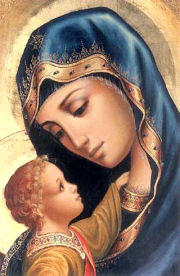
The link above provides an interesting little article on the etymology of the name, "Mary." Here's an excerpt:
In accordance with Jewish custom our Lady's parents named her eight days after her birth, and were inspired to call her Mary. The Hebrew name of Mary (in Latin Domina) means lady or sovereign; this Mary is in virtue of her Son's soveriegn authority as Lord of the World. We call Mary our Lady as we call Jesus our Lord, and when we pronounce her name we affirm her power, implore her aid and place ourselves under her protection.
Also, here's an insight on the rosary that I found helpful from St. Louis de Montfort's little treatise, The Secret of the Rosary (or online here). This could really apply to prayer in general:
This faith must be lively and informed by charity; in other words, to recite properly the Rosary, it is necessary to be in God's grace, or at least in quest of it. This faith must be strong and constant, that is, one must not be looking for sensible devotion and spiritual consolation in the recitation of the Rosary; nor should one give it up because his mind is flooded with countless involuntary distractions or one experiences a strange distaste in the soul and an almost continual and oppressive fatique in the body. Neither feeling, nor consolation, nor sighs, nor transports, nor the continual attention of the imagination are needed; faith and good intentions are quite enough. "Faith alone suffices" (From the Pange Lingua)
-- The Eleventh Rose: The Creed
Sunday, September 11, 2005
Fides Et Ratio and the Seat of Wisdom
Sedes Sapientiae, ora pro nobis.I turn in the end to the woman whom the prayer of the Church invokes as Seat of Wisdom, and whose life itself is a true parable illuminating the reflection contained in these pages. For between the vocation of the Blessed Virgin and the vocation of true philosophy there is a deep harmony. Just as the Virgin was called to offer herself entirely as human being and as woman that God's Word might take flesh and come among us, so too philosophy is called to offer its rational and critical resources that theology, as the understanding of faith, may be fruitful and creative. And just as in giving her assent to Gabriel's word, Mary lost nothing of her true humanity and freedom, so too when philosophy heeds the summons of the Gospel's truth its autonomy is in no way impaired. Indeed, it is then that philosophy sees all its enquiries rise to their highest expression. This was a truth which the holy monks of Christian antiquity understood well when they called Mary "the table at which faith sits in thought." In her they saw a lucid image of true philosophy and they were convinced of the need to philosophari in Maria.
May Mary, Seat of Wisdom, be a sure haven for all who devote their lives to the search for wisdom. May their journey into wisdom, sure and final goal of all true knowing, be freed of every hindrance by the intercession of the one who, in giving birth to the Truth and treasuring it in her heart, has shared it forever with all the world.-- paragraph 108
Friday, September 09, 2005
yesterday and today
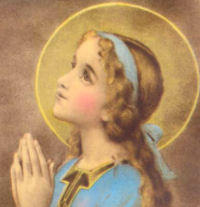
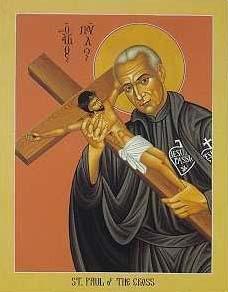 Maryland, yunno what I mean? But I've been wracking my brain since I've been here on who I should choose. I take this decision very seriously. First I was hung up on the whole liberal/conservative thing and if I should pick someone likeminded or not or if that even matters. Then I decided it doesn't and what really matters is A:) If he is personally holy and B:) If he could discern well the movement of the Holy Spirit, or lack thereof, in my life. I tend to get all bent outta shape with decisions like this! So I decided to pray one decade of the rosary for Mary's intercession. Since today is Friday, the day of the Sorrowful Mysteries, I was meditating on our Blessed Lord's agony in the garden. I didn't realize until the 8th Hail Mary that His agony in the garden was part of his Passion. Then I rememberd that one of the priests that I was thinking about choosing is in fact a Passionist. So I decided to go with him. I sent him an email and am waiting for his response. Thank you Blessed Mother for your guidance.
Maryland, yunno what I mean? But I've been wracking my brain since I've been here on who I should choose. I take this decision very seriously. First I was hung up on the whole liberal/conservative thing and if I should pick someone likeminded or not or if that even matters. Then I decided it doesn't and what really matters is A:) If he is personally holy and B:) If he could discern well the movement of the Holy Spirit, or lack thereof, in my life. I tend to get all bent outta shape with decisions like this! So I decided to pray one decade of the rosary for Mary's intercession. Since today is Friday, the day of the Sorrowful Mysteries, I was meditating on our Blessed Lord's agony in the garden. I didn't realize until the 8th Hail Mary that His agony in the garden was part of his Passion. Then I rememberd that one of the priests that I was thinking about choosing is in fact a Passionist. So I decided to go with him. I sent him an email and am waiting for his response. Thank you Blessed Mother for your guidance.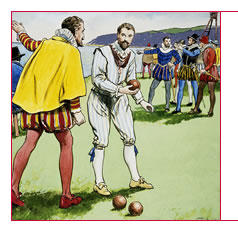
Tuesday, September 06, 2005
More books! and a brief explanation
Here's the required texts:
The Closing of the American Mind, by Allan Bloom
Culture Wars: The Struggle to Define America, by James Davison Hunter
Equality by Default: An Essay on Modernity as Confinement, by Philippe Beneton
An Intellectual History of Liberalism, by Pierre Manent
Sweeet.
...oh and don't worry Anne, I kept my Western Civ book :)
Now I'm looking forward to meeting with my mentor for the first time and finding a spiritual director amongst the faculty.
Finally, I wanted to briefly explain why I titled my previous post, "Mysterious Mystery at St. Mary's"
I was adoring Our Lord in the Blessed Sacrament during the Holy Hour on Wednesday and was contemplating my role at St. Mary's, how and why I was adoring Our Blessed Lord here in this place. I grew frustrated, as I'm accustomed to doing, because most of the hour seemed dry and unfeeling. But I reassured myself (listen closely dear readers) that's it's not about me feeling something in particular, it's about what Archbishop Timothy Dolan calls, "making a sacrifice of time." It's about spending time with our Lord simply because he deserves our time, adoration, and worship. Then I came to one realization toward the end of the hour. It's certainly by no means an exhaustive answer to the question I was asking our Lord, as I trust he will continue to unfold that answer to me as, God-willing, the years go by. But what I did come away with (to tide me over for now :) was the great Mercy he is showing me by calling me to seminary.
Here I am, in an evironment of routine prayer and formation where I can focus intently on my pursuit of holiness without the distractions of the "outside" world. Here I am in a place where I must pray morning and evening prayer every day and am highly encouraged to pray the other hours of the day as well! Here I am in a place where I must go to Mass every day! Here I am where spiritual reading and writing must take up a majority of my time! What Mercy He has shown me!
Now, granted, St. Josemaria Escriva would argue that one doesn't need to go to seminary or some far off retreat to be holy. One can be holy, even a saint, in his normal workaday state in life:
"How anxious people are to get out of place! Think what would happen if each bone and each muscle of the human body wanted to occupy some position other than its own. There is no other reason for the world's discontent. Continue where you are, my son; right where you are... how much you'll be able to work for the true kingdom of our Lord!" --The Way #832
"your perfection consists in living perfectly in the place, occupation and position in which God, through those in authority, has assigned you." -- The Way #926
But, God called me out of my place to be here. I did need to go away, to retreat. This is the mystery I'm discerning.
Sedes sapientiae, ora pro nobis

